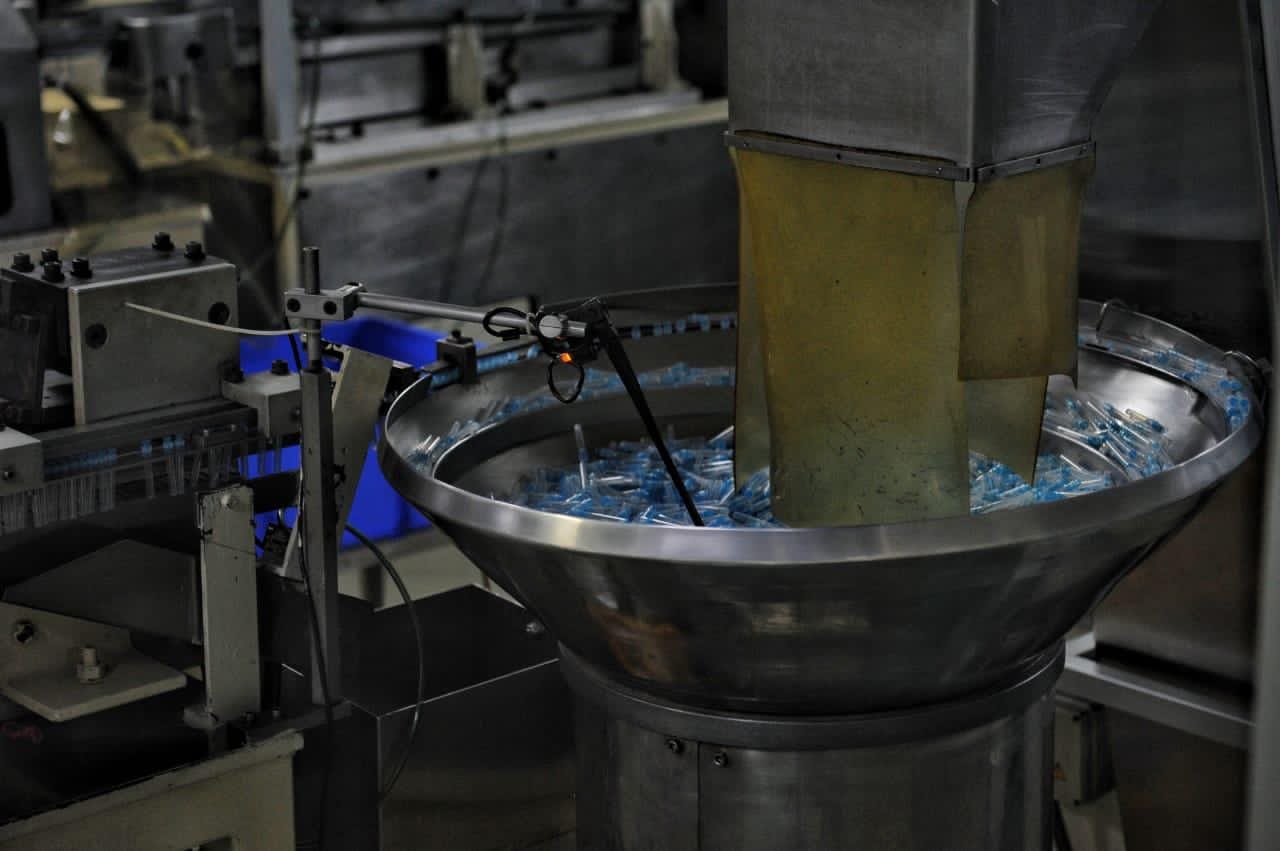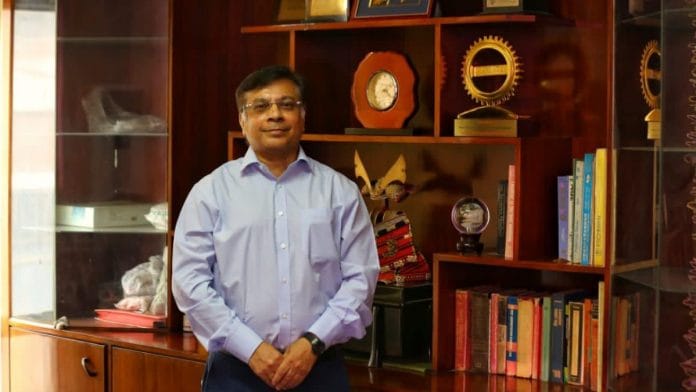Ballabhgarh (Haryana): Despite a plan to produce over 8,000 syringes a minute, the Haryana-based syringe maker, Hindustan Syringes and Medical Devices (HMD), is rejecting almost 40 emails every day from various countries requesting the firm to supply the “right type” of syringes required for Covid-19 vaccination.
This is how big the demand for syringes is from across the globe.
Amid the rush to develop a vaccine against Covid-19, the stockpiling of syringes did not gain relevance until recently when countries’ vaccination drives got stuck due to the unavailability of the right syringes.
According to the estimates of the medical device makers’ lobby, Association of Indian Medical Device Industry (AIMED), the world needs between 800 to 1,000 crore syringes to vaccinate 60 per cent of the population.
“Our export division is receiving more than 40 emails every day from the countries such as the US, Germany, Italy, Spain and other European countries,” Rajiv Nath, managing director, HMD, told ThePrint. “Brazil and Japan are also asking for syringes with low-dead space to allow minimum wastage of vaccine.”
The company, which manufactures a popular brand of syringes, Dispovan, is supplying products only to its older clients and “regretting the inconvenience” to the new queries due to inability to cater to “so much” demand.
Headquartered at Ballabhgarh, a dusty industrial area near Faridabad, the company says India should not worry. “We have created a stockpile that will help India and other developing countries at least until the middle of this year,” he said.
To create a stockpile further and help other countries speed up their vaccination drive, the company is planning to produce 8,200 syringes a minute — 40 per cent more than its current capacity of 5,900 syringes per minute.
Also read: Roald Dahl would want you to get vaccinated — he told me himself
Coming soon: 5.25 lakh syringes/hour to meet global demand
During non-Covid years, the company was producing around 200 to 250 crore syringes every year by using 70 to 80 percent of its total manufacturing capacity. This year, it is currently producing 270 crore syringes per annum and plans to increase capacity, to manufacture 300 crore syringes per annum, by July.
HMD regularly supplies syringes to the United Nations agency for children, UNICEF, for the latter’s immunisation programmes in several developing and underdeveloped countries.
Based on its credentials, last November, it bagged an order from UNICEF again to supply around 14 crore special syringes of 0.5 ml size — with an auto-disable feature — for the Covid-19 vaccine under the COVAX arrangement.
Apart from the orders from its own commercial clients across the globe, HMD has also received an order from the central government to supply 26.5 crore syringes by September.
To meet the given orders and help India create a stockpile of syringes for emergency requirements, the company will be ramping up its production capacity to churn more than 8200 syringes per minute.
“Per hour, we are producing 3.75 lakh syringes. The capacity will go up by 25 to 40 per cent by September (which would mean a jump in production capacity between 4.68 lakh per hour to 5.25 lakh per hour),” Nath, who is also forum coordinator for AIMED, said.
Deliveries to fulfill demand in India will always come first, he reiterates.
“We have been asked to keep two-third of capacity for the Indian government while one-third will be given for our global commitments that involve non-Covid vaccination drives as well for Yellow Fever, Measles, and other diseases,” he clarified.

‘Blood-sucker’ syringe is sold at just Rs 2 including taxes
These specialised syringes are typically sold for around Rs 2 including the taxes. In the international market, the price is around 3 cents (around Rs 2.1).
“We have invested around Rs 100 crore between May last year until now. The business of syringes is known as ‘blood sucker’ due to low return on investments,” Nath said.
He added that he had reached out to the government of India, the World Health Organisation (WHO), and several other reputed organisations to seek contracts, assurances of buying stock, and some advances for production. “No one replied. No one took it as urgency,” he said.
“We have taken a huge business risk as the demand for such syringes could fall drastically if Covid gets corrected or people stop taking vaccination jabs,” he added. “Otherwise, the return on investments is expected only in four to eight years and it might be highly unlikely that the vaccination drive continues beyond 2023.”
We all have already seen the same story with PPE kits, ventilators, and other emergencies whose market was urgently created, he added. “Where are they now, no one knows. The demand has simply vanished,” he said.
Giving an instance of how insignificant the price of syringes is, he said, “We recently supplied an order to Brazil where the country has paid air freight that was five times the price of the syringes.”
Also read: Are you above 45? Here are the 20 comorbidities that qualify you for Covid vaccine
‘Right type’ of syringes for Covid-19 vaccination
There are several types of syringes depending on a country’s requirements, Nath said.
For instance, syringes with needle stick prevention features (caps on the needles) are produced for North American and European countries where healthcare workers are protected from accidental injuries.
According to Nath, auto disable (AD) syringes are required for South Asia, including India and China, and Africa and Central America where syringe reuse is prevalent leading to diseases such as HIV/AIDS and hepatitis. These syringes have plunger locking and in some cases breaking mechanisms to prevent reuse.
Standard disposable syringes are used in the Middle East, Eastern Europe, and Southeast and Far East Asia. These are conventional syringes like Dispovan.
For Covid-19 vaccination, however, the requirements are more apart from the requirements of auto-disable syringes in several parts of the world, Nath said.
For instance, Japan had to discard millions of doses of the Pfizer-BioNTech vaccine due to wrong syringes. The European Union was also struggling to find the syringe that could fetch additional doses from Pfizer’s vial.
“We have been receiving requests from the countries post the launch of Pfizer vaccine for manufacturing 0.3 ml, auto-disable syringes or 1 ml standard disposable syringe with low dead space,” Nath said. “These are special syringes that could draw out the sixth dose from Pfizer’s vial considering it’s an expensive vaccine and wastage is huge.”
He added that they have been supplying the same product to UNICEF but have regretted inconvenience to several others.
Why is it a big opportunity for India?
In a non-Covid year, India exported around Rs 200 crore worth of syringes across the globe. However, India imports around Rs 400 crore worth of syringes from China due to lower custom duty and lower cost of products.
The United States and China are the two top markets manufacturing and supplying syringes across the globe. “The government of India, in the past, has imported more than 75 per cent of its total procurement orders from China,” Nath said.
According to him, the situation is different this year because China has jacked up prices of its syringes by 20- 40 per cent, partly due to steep increase in costs of raw and packaging material, and freight costs while the United States is busy fulfilling its own demand rather than meeting global orders.
“Hence, there is no competition from the two big countries and a big opportunity for us,” Nath said while adding that his company and Indian industry have never indulged in making a profit out of the crisis. “India came forward in supplying doses of HCQs, free-doses of vaccines and now, we are trying to plug the shortage of syringes, globally,” he added.
Also read: Why an efficient vaccine is not the same thing as a safe vaccine






